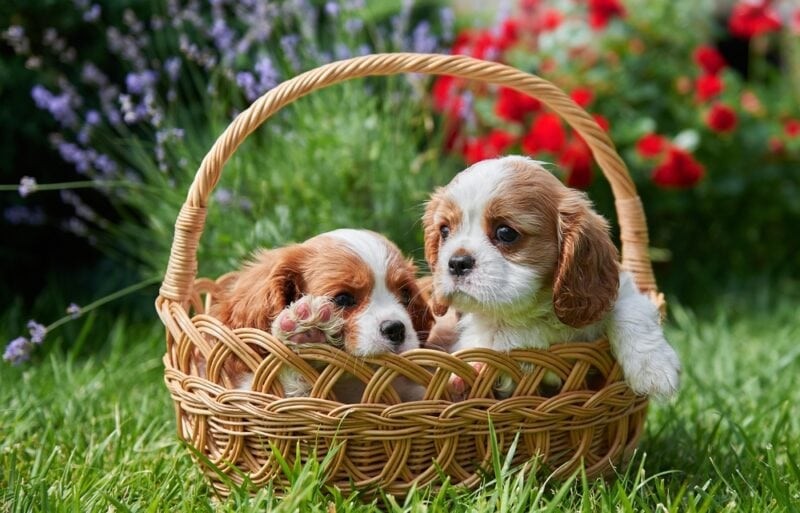
The Teacup Cavalier King Charles Spaniel represents a miniaturized version of the already-small standard breed, typically weighing under 5 pounds compared to the normal 13-18 pound range. While these tiny companions have gained popularity since the early 2000s, significant controversy surrounds their breeding practices and health risks. Despite their appealing diminutive size and sweet temperament, veterinary experts express serious concerns about purposeful breeding for extremely small sizes. This report examines the characteristics, origins, and important considerations surrounding these controversial "teacup" variations of the beloved Cavalier breed, which currently ranks 18th in AKC popularity.
Teacup King Charles Cavalier Background
Historical Development and Trends
The teacup variant of Cavalier King Charles Spaniels emerged in the early-mid 2000s during the teacup dog trend, which gained significant momentum after being featured in popular media like "The Simple Life" television show. While regular Cavaliers ranked 15th on the AKC's most popular breeds list in 2021, the teacup version became sought after despite controversy around breeding practices.
Maintenance Requirements
Due to their diminutive size of under 5 pounds and less than 10 inches in height, teacup Cavaliers require minimal physical space. Their portability allows them to be easily transported in bags and taken to various locations. However, potential owners should exercise caution as these dogs can develop separation anxiety when left alone for extended periods and may require specialized care due to their delicate size.
What Are Teacup Cavalier King Charles Spaniels? - Size, Appearance and Characteristics
Physical Attributes
Teacup Cavalier King Charles Spaniels are miniaturized versions of the standard breed, measuring only 5-10 inches in height compared to the regular 12-13 inches. These dogs weigh less than 10 pounds, with some weighing as little as 5 pounds, significantly lighter than standard Cavaliers at 13-18 pounds. They maintain the same elegant appearance and proportions as regular Cavaliers, just on a smaller scale.
Temperament Profile
These tiny dogs exhibit sweet-tempered and playful personalities, making them excellent companion pets. Despite their diminutive size, they retain the athletic nature of sporting Spaniels and enjoy chasing small animals when unleashed. Their lifespan ranges from 9-14 years, though this can vary based on breeding practices and care quality. While affectionate, they tend to form intense bonds with their owners and may develop separation anxiety if left alone for extended periods.
Health Concerns and Breeding Controversies of Teacup Cavaliers
Unethical Breeding Methods
Controversial breeding practices include deliberately starving dogs to stunt growth and marketing dogs with dwarfism as "rare teacups." Some breeders specifically mate runts with potential birth defects to achieve smaller sizes. According to veterinary experts, these practices pose significant health risks. Prices can reach $14,000 despite these concerns.
Health Vulnerabilities
Teacup Cavaliers face increased health risks due to their unnaturally small size. Since most are bred from runts or through crossbreeding with teacup breeds like Chihuahuas, they are particularly susceptible to genetic health issues. Their diminutive stature, often achieved through questionable breeding methods, makes them more fragile than standard Cavaliers. Veterinarians caution potential owners about these inherent health challenges that come with the teacup variety.
Acquisition and Cost Considerations
Market Value Analysis
Teacup Cavalier King Charles Spaniels command premium prices ranging from $2,000 to $14,000, significantly higher than standard Cavaliers. This price variation depends on factors like breeder reputation, bloodline quality, and the dog's specific characteristics. The high costs reflect both market demand and the specialized breeding required, though potential owners should note that higher prices don't necessarily guarantee healthier dogs.
Breeder Selection Guidelines
Responsible selection of breeders is crucial when considering a teacup Cavalier purchase. Prospective owners should verify breeding practices, request health certifications, and avoid breeders who advertise "rare" or "exotic" teacups. Due diligence includes checking breeder references, visiting facilities when possible, and understanding the specific breeding methods used to achieve the teacup size. This careful evaluation helps avoid supporting unethical breeding practices while increasing chances of acquiring a healthier pet.
Conclusion
Teacup Cavalier King Charles Spaniels represent a controversial trend in dog breeding that emerged in the early 2000s, offering miniaturized versions of the beloved Cavalier breed at 5-10 inches in height and under 10 pounds. While these tiny companions maintain the sweet-tempered and playful personalities of standard Cavaliers, they come with significant health concerns and ethical considerations. The breeding practices used to achieve their diminutive size, including deliberately stunting growth or breeding runts, have been widely criticized by veterinary experts.
The high market prices of $2,000-$14,000 reflect strong consumer demand but also raise concerns about exploitation through unethical breeding. Potential owners should carefully evaluate breeders, understand the increased health risks and specialized care requirements, and consider whether supporting this controversial breeding trend aligns with responsible pet ownership. The research suggests that while teacup Cavaliers can make loving companions, their artificial miniaturization often comes at the cost of their wellbeing, making it crucial for prospective buyers to prioritize health and ethical considerations over novelty.